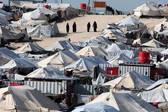Foreign Fighters and Family Members in Syria
To inform UK and international debates on foreign terrorist fighters and their families by investigating risks and identifying recommendations to address these security and humanitarian challenges.
The collapse of the ‘Islamic State caliphate’ in March 2019 was only a short-term military victory; global jihadism has not been defeated. The Islamic State caliphate and the Syria conflict mobilised the largest number of foreign terrorist fighters since the emergence of the global jihadist movement in the 1980s, also enlisting a new generation of family members.
Thousands of foreign terrorist fighters remain in detention in northeast Syria, along with their family members, including women and children from some 60 countries. Their ongoing detention risks creating a permissive environment for violence, exploitation, abuse and potential radicalisation, as well as disenfranchisement and trauma. No resolution to this challenge has emerged, either at the international or at a national level and, except in a minority of cases, no answer was provided on what to do with these individuals.
The project investigated the challenges facing national governments and the international community through in-depth research and engagement with leading academics, multilateral organisations, operational partners, lawyers, policymakers, and practitioners.
Project team
Sabin Khan
Dr Imogen Parsons
Former Senior Research Fellow
Emily Winterbotham
RUSI Senior Associate Fellow, Terrorism and Conflict
Michael Jones
Senior Research Fellow
Terrorism and Conflict
Dr Karin von Hippel
RUSI Distinguished Fellow, Director-General's Office
Malcolm Chalmers
Former Deputy Director General, RUSI
Suzanne Raine
RUSI Trustee
Sir Mark Rowley
Distinguished Fellow
Lord Carlile of Berriew CBE, KC
RUS Distinguished Fellow, RUSI International
Eric Rosand
RUSI Senior Associate Fellow, Terrorism and Conflict
Raffaello Pantucci
RUSI Senior Associate Fellow, International Security
Aims and objectives
This RUSI initiative sought to investigate and make recommendations on how the international community should deal with the potential security risks posed by foreign terrorist fighters and their family members in Syria.
We:
- Analysed the risks to national and transnational security posed by foreign terrorist fighters and their families and highlighted the key practical challenges, offering recommendations for governments and the international community.
- Influenced governments and policymakers to adopt the recommendations and incorporate into national and international counter-terrorism (CT) policy development.
- Provided ongoing independent analysis and research on this subject area and influenced policymakers, academia, and wider practitioners operating within this field.
Project outputs
Access the key outputs produced as part of this project
Project impact
Responses to the Occasional Paper: Resolving the Stalemate: Foreign Fighters and Family Members in Syria
Lord Carlile of Berriew CBE, QC, RUSI Distinguished Fellow and former UK Independent Reviewer of Terrorism Legislation said:
This report is required reading, especially for the many politicians who prefer to avoid the repatriation issue under discussion. The aspiration for concerted international, multilateral action is the correct way to empty the holding camps. What is now needed is the courage among nations to make a reality of the wise advice the report offers.
Lord Carlile of Berriew CBE, KC
RUS Distinguished Fellow, RUSI International
Suzanne Raine, RUSI Trustee and former Head of the Joint Terrorism Analysis Centre, said:
This stark and practical report reminds us how unfinished the conflict against Daesh is and presents the long-term consequences of inaction. By showing that neither nation states nor multilateral organisations alone will be able to provide an enduring solution it argues for a determined and collaborative approach, with global leadership. A stalemate which includes impunity for perpetrators should be unacceptable.”
Suzanne Raine
RUSI Trustee
Stephen Rapp, Former US Ambassador-at-Large for Global Criminal Justice and Senior Visiting Fellow, Oxford Institute for Ethics, Law and Armed Conflict said:
This report should awaken us to the reality that current inaction has created a ‘justice vacuum’ that ensures impunity for the major perpetrators of genocide while it increases the risks of ISIS' revival. States must heed its call for joint action to provide the necessary legal tools and investigative capacity to hold the most responsible to account through processes that will provide justice for the victims, protection of public security, and deterrence of similar crimes in the future."
Stephen Rapp
Former US Ambassador-at-Large for Global Criminal Justice and Senior Visiting Fellow, Oxford Institute for Ethics, Law and Armed Conflict
Sir Mark Rowley, RUSI Distinguished Fellow and former National Police Lead for Counter Terrorism and Assistant Commissioner in the Metropolitan Police Service said:
There are no easy answers to the temporary solutions currently holding foreign terrorist fighters, but current international fudge creates a dangerous long-term threat. The most powerful conclusion in this RUSI report is the absence of a fully resourced multilateral international effort to gather evidence necessary to remove the sense of impunity for atrocities and incarcerate many of those who threaten future security. The deceased victims and widely scattered survivors are surely entitled to this resolution.”
Sir Mark Rowley
Distinguished Fellow


















